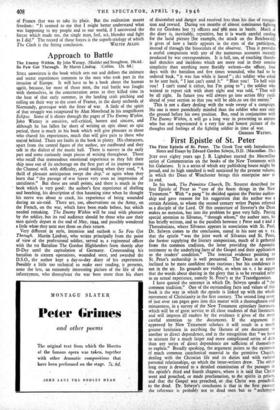Approach to Battle
STILL unwritten is the book which sets out and defines the intimate and secret experiences common to the men who took part in the invasion of Europe. It will have to be a book about the human spirit, because, for most of those men, the real battle was fought with themselves, in the concentration areas as they killed time in The heat of that early summer, in the landing craft pitching and rolling on their way to the coast of France, in the dusty orchards of Normandy, grotesque with the litter of war. A little of the spirit of that struggle was recaptured by Alan Moorhead in his magnificent Eclipse. Some of it shines through the pages of The Enemy Within. John Watney is sensitive, self-critical, honest and sincere, and although he has fallen far short of writing an epic about an epic period, there is much in his book which will give pleasure to those who shared his experiences, much that will give pain to those who stayed behind. There are faults in the book in plenty. His characters, apart from the central figure of the author, are cardboard and they talk in the dialect of the music hall. There is naivety in the early part and some curiously inept pieces of writing throughout. Those who recall that tremendous emotional experience as they felt their ship nose out of its anchorage on the first part of its journey across the Channel will, with difficulty, avoid smiling when they read, "A thrill of pleasant anticipation swept the ship," or again when they learn that " the passage of war leaves very soon an impression of untidiness." But these are small points, and there is much in the book which is very good : the author's first experience of shelling and bombing, his description of that haunting time when he thought his nerve was about to crack, his experience of being wounded during an -air-raid. There are, too, observations on the Army, on the French, on the war, which have been made before, but which needed remaking. The Enemy Within will be read with pleasure by the soldier, but its real audience should be those who saw their men quietly depart at the end of May, 1944, and possibly wondered a little when they next met them on their return.
Very different in style, intention and outlook is So Few Got Through. Martin Lindsay, who writes principally from the point of view of the professional soldier, served as a regimental officer with the 1st Battalion The Gordon Highlanders from shortly after D-Day until the capitulation of Germany. Commanding his battalion in sixteen operations, wounded once, and awarded the D.S.O., the author kept a day-to-day diary of his experiences. Possibly a little too technical to make easy reading, it presents, none the less, an extremely interesting picture of the life of the infantryman, who throughout the war bore more than his share
of discomfort and danger and received less than his due of recogni- tion and reward. During ten months of almost continuous fighting the 1st Cordons lost 75 officers and 986 men in battle. Much of the diary is, inevitably, repetitive, but it is worth careful reading for the lucid picture (for example, the attack on the Reichswald) it gives of how a battle appears in the eyes of the participant, instead of through the binoculars of the observer. Thus it provides a useful comparison with any of the numerous accounts recently produced by war correspondents. It is full, too, of touching thumb- nail sketches and incidents which are more real in their concise simplicity than anything more floridly written—the officer, four days with the battalion and five times wounded, who had to be ordered back, " it was fun while it lasted " ; the soldier who asked to be sent back, " I just can't stand it." "Blast you! To hell with you! I can't stand it either, but I'm going to" ; the soldier who wanted to report sick with short sight and was told, "That will be all right. In future you will always go into action fifty yards ahead of your section so that you will be able ,to see the enemy."
This is not a diary dealing with the wide sweep of a campaign. No one is more parochially minded than the soldier who sees only the ground before his own position. But, read in conjunction with The Enemy Within, it will go a long way in presenting to anyone who has not experienced it a very fair and honest picture of the thoughts and feelings of the fighting soldier in time of war.
GRAHAM WATSON.






























 Previous page
Previous page